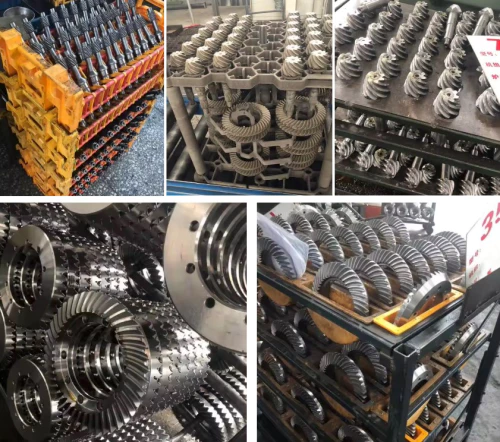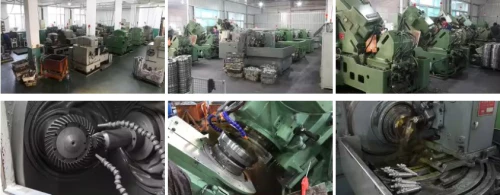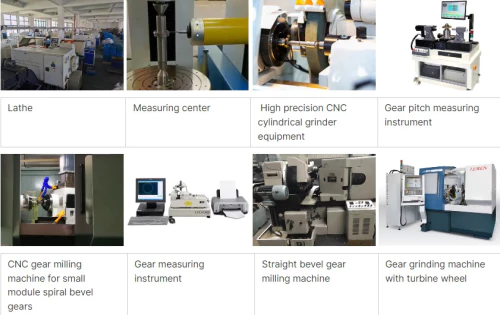Forging Bevel Gear Tooth Contact Stress Analysis Software
Introduction
Forging bevel gears are a type of bevel gears that are manufactured through the forging process. Forging involves shaping metal through the application of localized compressive forces, typically using a die or hammer. In the case of bevel gears, the forging process is used to form the gear teeth and create the desired gear geometry.
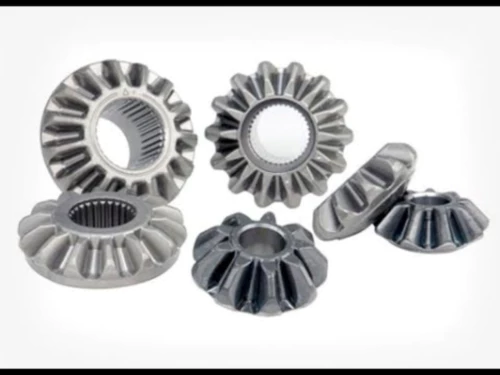
Advantages
- High Strength: Forging bevel gears are known for their superior strength, making them suitable for heavy-duty applications.
- Improved Fatigue Resistance: The forging process enhances the fatigue resistance of bevel gears, ensuring longer service life.
- Precise Gear Tooth Geometry: The forging process allows for precise control over the gear tooth shape and geometry, resulting in better performance.
- Cost-Effectiveness: Despite their high strength and performance, forging bevel gears offer cost-effective solutions for various industries.
- Versatility in Material Selection: Bevel gears can be forged using a wide range of materials, allowing for customization based on specific application requirements.
- Enhanced Structural Integrity: The forging process eliminates internal voids and porosity, ensuring a higher level of structural integrity.
- Tailored Mechanical Properties: The forging process allows for the optimization of mechanical properties, such as hardness and toughness, to meet specific application needs.
- Reduced Lead Time: Compared to other manufacturing methods, forging bevel gears can be produced with shorter lead times.
- Environmental Sustainability: The forging process is known for its minimal material waste and energy consumption, making it an environmentally friendly option.
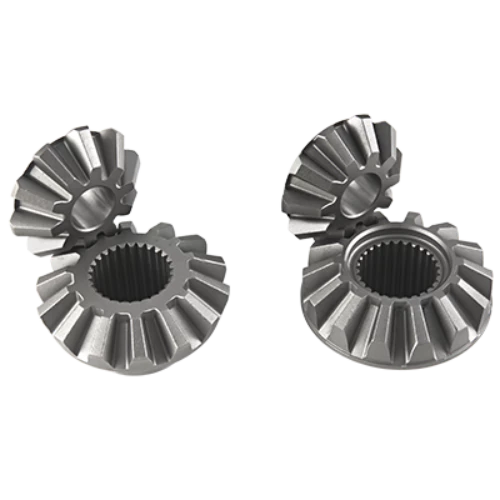
Working Principle
Forging bevel gears operate based on the fundamental principles of gear mechanisms. They consist of two intersecting shafts, each with a conically shaped gear (bevel gear) mounted on it. The teeth of the bevel gears are designed to have a specific tooth profile, such as straight, spiral, or hypoid, depending on the application requirements.
When the input shaft rotates, the engagement of the teeth of the bevel gears causes a transfer of rotational motion and torque to the output shaft. The contact between the mating teeth ensures power transmission while maintaining proper alignment and smooth operation.
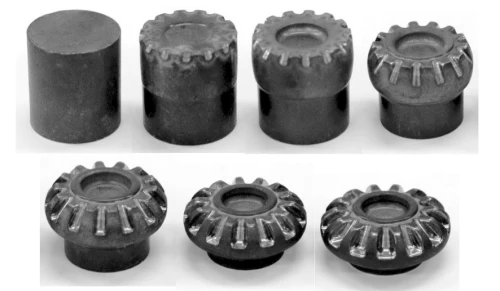
Applications
- Automotive Industry: Forging bevel gears are widely used in automotive transmissions and differential systems.
- Industrial Machinery: Bevel gears play a crucial role in various industrial machinery applications, such as mining equipment and heavy machinery.
- Aerospace and Defense: The aerospace and defense sectors rely on bevel gears for applications like aircraft engines and military vehicles.
- Renewable Energy: Bevel gears are essential components in wind turbines and solar power systems.
- Marine and Shipbuilding: Marine vessels and shipbuilding require bevel gears for propulsion systems and steering mechanisms.
- Agricultural Machinery: Bevel gears are used in agricultural machinery, such as tractors and harvesters, for efficient power transmission.
- Power Generation: Bevel gears are used in power plants to transfer power from turbines to generators.
- Robotics and Automation: Bevel gears are utilized in robotics and automation systems for precise motion control.
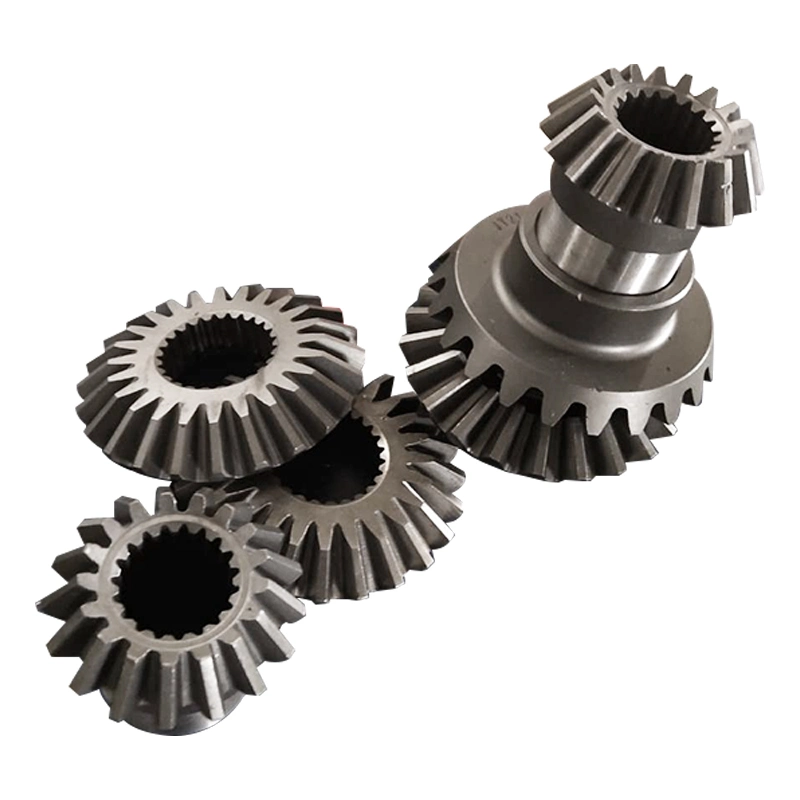
Installation and Maintenance
Installation
- Proper Alignment
- Lubrication
- Mounting Bolts
- Inspection
Maintenance
- Lubrication
- Cleaning
- Inspection
- Replacements
- Gearbox Maintenance
- Load Monitoring
- Training and Expertise
- Record-Keeping
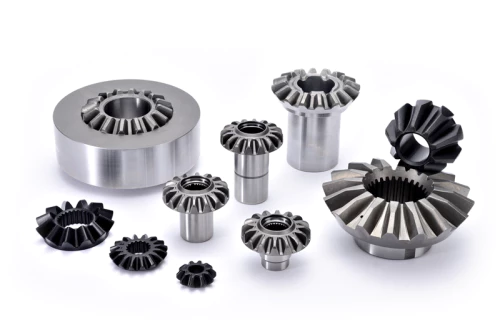
How to Select the Right Forging Bevel Gear
- Application Requirements: Consider the specific application requirements, such as load capacity and operating conditions.
- Design and Specifications: Determine the appropriate design and specifications based on the application needs.
- Material Selection: Choose the material that offers the required strength, durability, and other mechanical properties.
- Quality and Reliability: Ensure that the forging bevel gear meets the desired quality and reliability standards.
- Load-Carrying Capacity: Evaluate the gear's capacity to handle the required load without failure.
- Efficiency and Performance: Consider the gear's efficiency and performance to ensure optimal operation.
- Customization and Adaptability: Look for options that offer customization and adaptability for specific application needs.
- Cost Considerations: Evaluate the overall cost-effectiveness of the forging bevel gear, considering factors like initial cost, maintenance, and lifespan.
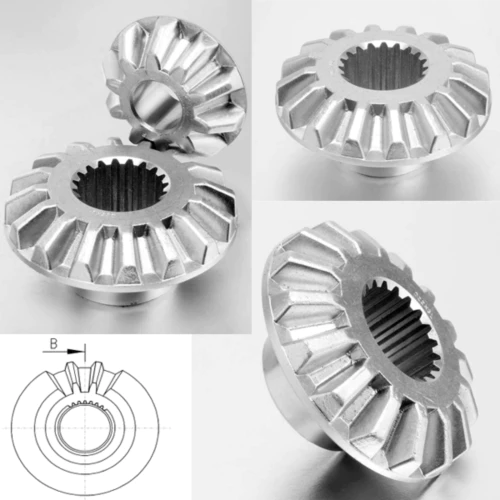
Shaoxing Chaoli – Your Reliable Gear Manufacturer
Shaoxing Chaoli is a professional gear manufacturer based in China. Our products are exported to different countries around the world, including Spain, the Netherlands, the United States, South Korea, Turkey, and Russia. We are dedicated to helping our customers develop new products and solve technical and quality problems. With our high-quality products, fair prices, and excellent services, we strive to meet the needs of our users.
At Shaoxing Chaoli, we adhere to the principles of quality first, timely delivery, and credit first. We treat every business partner sincerely and warmly welcome friends from the business community to cooperate with us and create brilliance together. In addition to forging bevel gears, we also offer other gear products such as worm gears, spiral bevel gears, helical gears, spur gears, plastic gears, and metric gear racks. Customized products are available upon inquiry.
Shaoxing Chaoli is a professional gear manufacturer in China with a wide range of customers, including domestic steel rolling mills, shipyards, precision machine tool factories, automation machinery factories, and various distribution companies. Our products are also exported to Western Europe, the Middle East, Southeast Asia, and other regions. With a team of engineers and advanced equipment, we ensure the highest level of quality and competitiveness in the industry.
